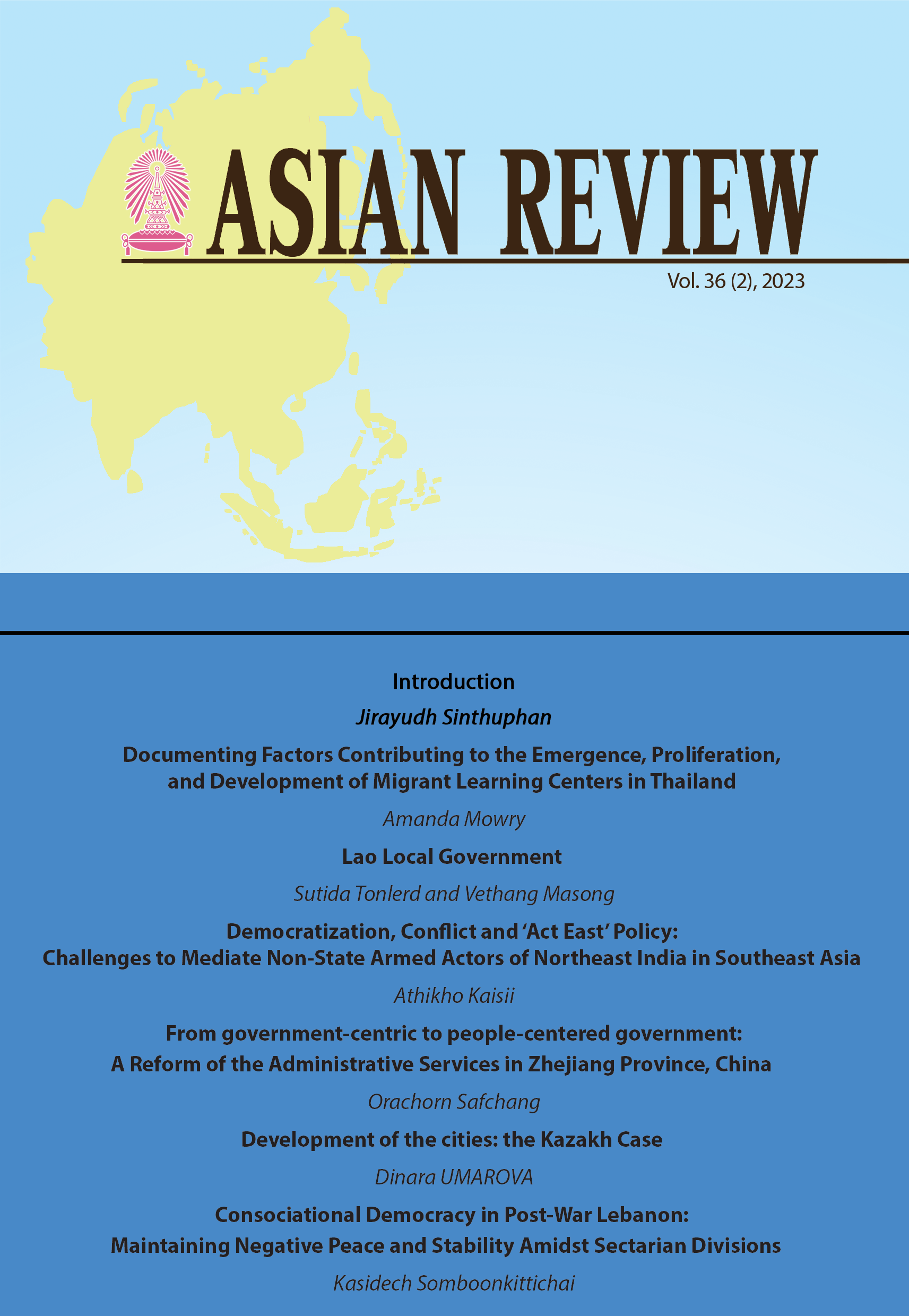Democratization, Conflict and ‘Act East’ Policy:
Challenges to Mediate Non-State Actors of Northeast India in Southeast Asia
DOI:
https://doi.org/10.14456/arv.2023.7Keywords:
Action-oriented, alternative administration, democratic mechanism, Southeast AsiaAbstract
Non-state actor in Northeast India is a pre-independence phenomenon, and with the exception of Assam, the seed of institutionalizing violence was sown prior to the formation of the states. In course of time non-state actor has turned into non-state armed actor. Experience has proved that the formation of states as the process of democratization is yet to soothe the conflict in the region. With this salient reality, “Act East” seen as a path-breaking policy with a multi-prong strategy aiming to overhaul the image of the Northeast through rebuilding India’s historical ties with Southeast Asia, needs to embed a viable action-oriented democratic mechanism to mitigate the conflict. This paper aims to address how an ambitious approach to “Act East” is crafting a conducive milieu to alleviate the issue of the non-state armed actors in the region.
References
Bajpayee, Chietigj. 2017. “Dephasing India's Look East/Act East Policy.” Contemporary Southeast Asia39 (2):348-372.
Bose, PratimRanjan. 2019. “Connectivity is no Panacea for an Unprepared Northeast India.” Strategic Analysis 43: 335-342.
Cervellati, Matteo and Sunde, Uwe. 2014. “Civil Conflict, Democratization, and Growth: Violent Democratization as Critical Juncture.” The Scandinavian Journal of Economics 116(2): 482-505.
Chairman's Statement of the 12th ASEAN -India Summit (12 November 2014), Nay Pyi Taw, Myanmar. Accessed August 5, 2021. https://asean.org/wp-content/uploads/2012/05/25th-Chairman-Statement-ASEAN-India-Summit.pdf
Clastres, Pierre. 1989. State against the Society: Essays in Social Anthropology. New York: Zone Books.
Franke, Marcus. 2009.War and Nationalism in South Asia: The Indian State and the Nagas. New York:Routledge
International Council on Human Rights Policy (ICHRP). 1999. Ends and Means: Human Rights Approaches to Armed Groups, Geneva.
International Institute for Democracy and Electoral Assistance (IIDEA). 2006.Democracy, Conflict and Human Security-Policy Summary: Key Findings and Recommendations, Stockholm, Sweden.
Karl, Terry Lynn. 1990. “Dilemmas of Democratization in Latin America.” Comparative Politics 23 (1):1-21.
Kumar, B. B. 2007.Problems ofEthnicity in theNorth-East India. New Delhi: Concept Publishing.
Lee, Lavina. 2015. “India as a Nation of Consequence in Asia: The Potential and Limitations of India's 'Act East' Policy.” The Journal of East Asian Affairs29(2): 67-104.
Mansfield, Edward. D. and Snyder, Jack. 1995. “Democratization and the Danger of War.” International Security20 (1): 5-38.
Mathur, Kuldeep. 1992. “The State and the Use of Coercive Power in India.” Asian Survey 32 (4): 337-349.
Mirimanova, Natalla. 1997. “Democratization and Conflicts in Russia and the Newly Independent States.” Annals of the American Academy of Political and Social Science552(1): 86-97.
Morung Express. 2022. “No peace unless there is solution: Neiphiu Rio.” 15 February. Accessed February21, 2022.https://morungexpress.com/no-peace-unless-there-is-solution-neiphiu-rio
Nagaland Post. 2017.Centre May Soon Invite NNPGs for Talks: R.N Ravi, 5 September. Accessed May 15, 2023. https://nagalandpost.com/index.php/centre-may-soon-invite-nnpgs-for-talks-rn-ravi
Palit, Amitendu. 2016. “India’s Act East Policy and Implications for Southeast Asia.” Southeast Asian Affairs. 81-92.
Rakner, Lise, Menocal, Alina Rocha and Fritz, Verena. 2007. “Democratisation’s Third Wave and the Challenges of Democratic Deepening: Assessing International Democracy Assistance and Lessons Learned.” ODI, Working Paper 1, Overseas Development Institute, London.
Saha, Abhishek. 2020. “NSCN-K faction announces ceasefire, signals return to peace talks.” Indian Express. 24 December.
Savun, Burcu and Tirone, Daniel C. 2011. “Foreign Aid, Democratization, and Civil Conflict: How Does Democracy Aid Affect Civil Conflict?” American Journal of Political Science 55(2): 233-246.
Scott, James, C. 2009. The Art of Not Being Governed: An Anarchist History of Upland Southeast Asia. London: Yale University Press
Scott, James, C. 1998.Seeing Like a State: How Certain Schemes to Improve the Human Conditions have failed. London: Yale University Press.
Sikir, Rajiv. 2019.Challenge and Strategy: Rethinking India's Foreign Policy. New Delhi: Sage.
Snyder, Jack. 2000.From Voting to Violence: Democratization and Nationalist Conflict. New York:W.W Norton.
The New Indian Express. , 21 November, 2023, “Political problem in Manipur, political resolution needed: Eastern Army Commander.” 21 November. Accessed January 8, 2024.https://www.newindianexpress.com/nation/2023/nov/21/political-problem-in-manipur-political-resolution-needed-eastern-army-commander-2634977.html
The Northeast Today. 2019. “Naga Talks: Civil Orgs ‘unhappy’ over exclusion, NSF shoots memo to PM Modi.” 23 October. Accessed August 10, 2021. https://thenortheasttoday.com/states/nagaland/naga-talks-civil-orgs-unhappy-over-exclusion-nsf-shoots/cid2531841.htm
Vanaik, Achin. (1988), “Is There a Nationality Question in India?” Economic and Political Weekly 23(44): 2278-2289.
Downloads
Published
How to Cite
Issue
Section
License
Copyright (c) 2024 Instiute of Asian Studies, Chulalongkorn University

This work is licensed under a Creative Commons Attribution-NonCommercial-NoDerivatives 4.0 International License.
Published articles are under the copyright of the Instiute of Asian Studies, Chulalongkorn University. Partially or totally publication of an article elsewhere is possible only after the consent from the editors.







